Poland has just announced its policy priorities for its EU presidency in 2011. And topping the list is EU defense, followed by energy security. Jean Quatremer claims it comes in response to the U.S. reversal on the missile defense system, and characterizes it as a “véritable révolution.” The former is certainly possible, even likely. I’m less convinced by the latter. As Laura Chappell pointed out in her excellent WPR Strategic Posture Review for Poland, EU defense has occupied an increasingly prominent position in Poland’s national security calculations. The reason being, Poland prefers being actively involved in any security architecture that […]
Russia Archive
Free Newsletter
Russian President Dmitry Medvedev emerged from a meeting with U.S. President Barack Obama with a more open attitude toward tougher sanctions against Iran in the event negotiations over Tehran’s nuclear program don’t produce results. That’s a pretty quick dividend from the missile defense decision, but I think Nikolas Gvosdev is spot on here: But the crux of the matter for the U.S. is not when Tehran crosses theline and has a working bomb, it is trusting Iran to have a nuclearinfrastructure like Japan’s. I think that Russia will be far moresupportive of “trusting” Iran with nuclear technology than a U.S. […]
President Barack Obama’s rollback of the European-based ballistic missile defense system is a strategic blunder that will incentivize Russian intransigence at the negotiating table, erode relations with loyal U.S. allies in Central and Eastern Europe, and ultimately place the American homeland at greater risk. The about-face stands in a long line of similar American miscalculations on Russia and its leaders. Famously misreading his Soviet counterpart, Joseph Stalin, President Franklin Delano Roosevelt once mused, “If I give him everything I possibly can and ask nothing from him in return, [he] won’t try to annex anything and will work with me for […]
The Russian-state-sponsored television channel Russia Today quotes thechief of the Russian armed forces general staff as saying Russia wouldview any U.S. missile defense system negatively unless it were jointlydeveloped with Russia. It remains to be seen whether Russia will dropits plans to deploy missiles to its westernmost Kaliningrad region, thechannel reports. Related from WPR: Global Insights: Tough Road for NATO-Russian BMD Cooperation
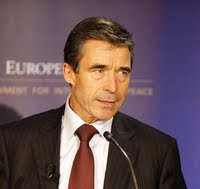
In his first major speech as the alliance’s new civilian head, NATO Secretary General Anders Fogh Rasmussen told an audience in Brussels that the time had come to revitalize security ties between Moscow and the Western alliance. Reflecting the speech’s hopeful title, “NATO and Russia: A New Beginning,” Rasmussen identified several possible areas for deeper collaboration. But the most newsworthy focus of his presentation was on ballistic missile defense (BMD). Rasmussen’s remarks came on the heels of U.S. President Barack Obama’s announcement the previous day that his administration would suspend the U.S. missile defense systems planned for Poland and the […]

The decision by the Obama administration to drop the missile defense plan in Eastern Europe was based on a revised perception of Iran’s long-range missile threat. The move is bound to have multiple and contradictory effects on the thorny issue of Iran’s nuclear program, which is slated to be a central subject of multilateral discussions at the opening of the U.N.’s General Assembly this week, as well as at the G-20 gathering in Pittsburgh days later. Diminishing the threat perception of Iran’s missile program from previous assessments under the Bush administration is certainly conducive to the IAEA — that is, […]
Two compelling analyses of the missile defense decision, one here by Robert Haddick and another here by Jeffrey Lewis. From everything I’ve read, the consensus across the board, with the exception of religious missile defense supporters and partisan opportunists, is that this was the right decision from a military hardware perspective. And both Haddick and Lewis fall into this camp. Haddick argues, though, that the politics are wrong, mainly because the reconfigured “adaptable and flexible” system does not represent the same kind of commitment to allies that an American presence on the ground does. Meanwhile, Lewis argues that contrary to […]
It looks like President Barack Obama is getting his Iran ducks lined up in advance of the meeting scheduled between the P5+1 and Iran in October. Duck 1: On Tuesday, Obama spoke with French President Nicolas Sarkozy by telephone for a half-hour, during which Iran was a central topic of conversation. PressTV later reported that on Tuesday, too, Sarkozy told lawmakers from his governing UMP, “It is a certainty to all of our secret services. Iran is working today on a nuclear [weapons] program.” I’m still trying to confirm that Sarkozy actually made those remarks, since although AFP picked up […]
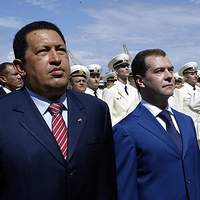
Venezuelan President Hugo Chavez’s latest visit to Moscow resulted in a package of arms and energy deals that highlight the mutually beneficial nature of the current Russian-Venezuelan relationship. Facing declining purchases from traditional arms clients, such as India and especially China, Russia has sought to compensate by expanding arms sales to new markets, including in Latin America. For the most part, however, Russian sellers have not been able to achieve major successes, despite Latin American countries doubling the volume of weapons they purchased between the periods of 1999-2003 and 2004-2008. Although the share of Russian arms exports going to Latin […]
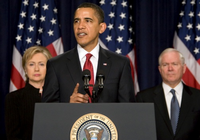
During the last several weeks, Americans have found themselves back in the middle of a fierce debate over our continuing military effort in Afghanistan. What was Bush’s forgotten war had, until recently, seemed quite safely transformed in public opinion into Obama’s “war of necessity.” Now, because of Gen. Stanley McChrystal’s request for significantly more troops, coming on the heels of his public declaration that the Taliban are essentially “winning,” the ruling Democrats have suddenly been thrust back into “quagmire” mode. Predictably, we are once again awash in feverish Boomer analogies to Vietnam, despite the pronounced absence in Afghanistan of any […]

Last week, the United Nations Conference on Trade and Development (UNCTAD) issued a report calling for sweeping changes in the international financial and monetary order. Arguing for a reduced role for the dollar, the report advocated for a global reserve bank with the power to issue its own currency, to monitor its members’ national exchange rates, and to prop up or push down their currencies. In other words, UNCTAD is making the case for a global central bank. The U.N. is not alone in calling for such a move. Since the eruption of the global financial crisis last fall and […]
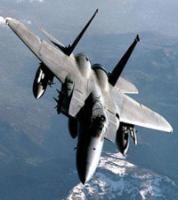
A study by the Congressional Research Service (CRS) found that U.S. arms sales surged last year, despite the worst global economic downturn in decades. (UPDATE: WPR subscribers can download the CRS report here.) In 2008, U.S. arms dealers signed new weapons contracts worth approximately $37.8 billion, a considerable increase from previous years. The surge was remarkable given that the total volume of new arms orders in 2008, $55.2 billion, was billions of dollars below the comparable figures for 2007 and 2006. The United States also fortified its position as the leading arms-exporting country. Last year, the volume of global defense […]
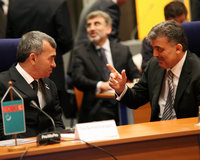
Less than a month after making progress on the Nabucco pipeline deal, which has now secured half of the gas needed to fill it, Turkey signed another natural gas agreement in early August that will allow access into Turkish territorial waters to the South Stream pipeline. South Stream, a Russian-Italian venture, is designed to bring Russian gas to Bulgaria while bypassing troublesome transit countries on the route between the Russian Federation and the European Union. A few days later, Turkey also held discussions with the emir of Qatar, Hamad bin Khalifa Al-Thani, on pipeline and liquefied natural gas (LNG) projects, […]
